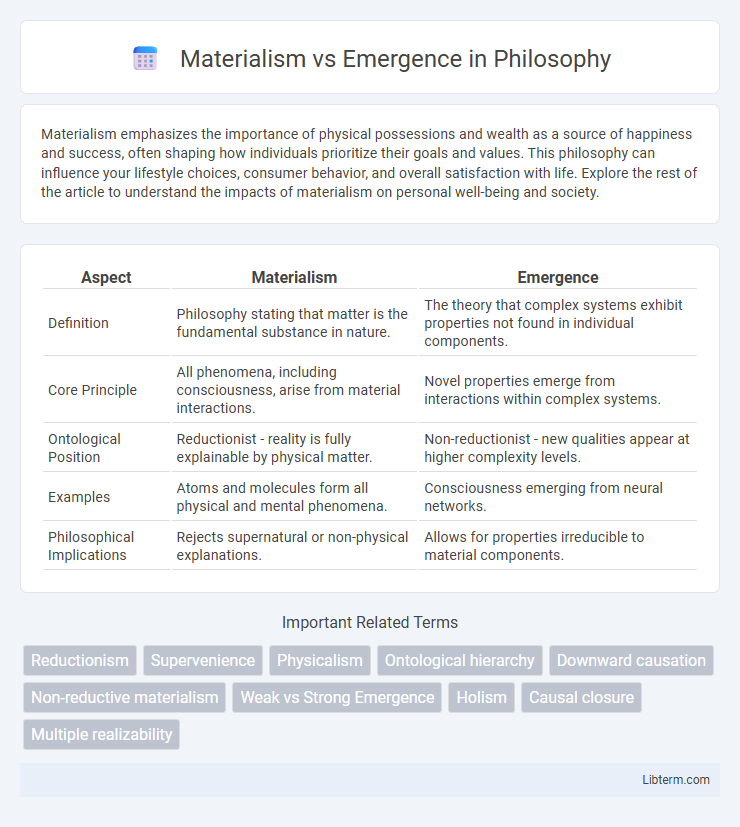Materialism emphasizes the importance of physical possessions and wealth as a source of happiness and success, often shaping how individuals prioritize their goals and values. This philosophy can influence your lifestyle choices, consumer behavior, and overall satisfaction with life. Explore the rest of the article to understand the impacts of materialism on personal well-being and society.
Table of Comparison
| Aspect | Materialism | Emergence |
|---|---|---|
| Definition | Philosophy stating that matter is the fundamental substance in nature. | The theory that complex systems exhibit properties not found in individual components. |
| Core Principle | All phenomena, including consciousness, arise from material interactions. | Novel properties emerge from interactions within complex systems. |
| Ontological Position | Reductionist - reality is fully explainable by physical matter. | Non-reductionist - new qualities appear at higher complexity levels. |
| Examples | Atoms and molecules form all physical and mental phenomena. | Consciousness emerging from neural networks. |
| Philosophical Implications | Rejects supernatural or non-physical explanations. | Allows for properties irreducible to material components. |
Understanding Materialism: Core Principles
Materialism asserts that all phenomena, including consciousness and mental states, arise solely from physical matter and its interactions. The core principles emphasize that everything can be explained through the properties and behaviors of material substances without invoking non-physical entities. This perspective underpins scientific inquiry by prioritizing observable, measurable phenomena as the foundation of reality.
Defining Emergence: Concepts and Context
Emergence refers to complex systems and patterns arising from the interaction of simpler components, often exhibiting properties not predictable from individual parts alone. In contrast to materialism's focus on matter as the fundamental substance, emergence emphasizes relational and systemic properties that cannot be reduced merely to physical components. This concept is crucial in fields like biology, neuroscience, and philosophy, where novel behaviors and qualities arise at higher levels of organization.
Historical Perspectives on Materialism and Emergence
Historical perspectives on materialism reveal its roots in ancient Greek philosophy, where thinkers like Democritus proposed that matter is the fundamental substance of reality. Emergence gained prominence in the 20th century, emphasizing that complex systems possess properties not reducible to their individual components, depicted in biology and consciousness studies. The debate between materialism and emergence continues to shape discussions in philosophy of mind, physics, and metaphysics, highlighting tensions between reductionism and holistic explanations.
Key Differences Between Materialism and Emergence
Materialism asserts that all phenomena are the result of physical matter and its interactions, emphasizing a reductionist view where everything can be explained by fundamental particles and their laws. Emergence highlights how complex systems and properties arise from simpler components but cannot be fully predicted or explained solely by their parts, focusing on novel qualities that manifest at higher levels of organization. The key difference lies in materialism's belief in basic physical explanations versus emergence's acknowledgment of new, irreducible properties arising from systemic complexity.
Philosophical Arguments for Materialism
Philosophical arguments for materialism emphasize that all phenomena, including consciousness and mental states, arise from physical processes and matter interactions within the brain. Materialism asserts that everything that exists is either matter or dependent on matter, making mental experiences reducible to neurobiological functions, supported by extensive neuroscientific evidence. This stance opposes dualism by denying any non-physical substances or properties, ensuring a unified and empirically verifiable ontology.
Supporting Emergence: The Case for Novel Properties
Emergence supports the idea that complex systems exhibit novel properties not reducible to their individual components, highlighting phenomena like consciousness arising from neural interactions. These emergent properties demonstrate that higher-level organizational patterns cannot be fully explained by materialist reductionism alone. Scientific studies in fields such as biology and cognitive science provide empirical evidence for properties that manifest uniquely at macro levels, reinforcing the case for emergence.
Materialism in Science: Impact and Applications
Materialism in science posits that all phenomena, including consciousness and cognition, can be explained through physical processes and matter interactions, providing a foundational framework for empirical research and technological innovation. Its impact is evident in fields such as neuroscience, where materialist principles guide brain mapping and neuropharmacology, and in artificial intelligence, where computational models simulate cognitive functions based on material substrates. Applications of materialism drive advancements in medical diagnostics, quantum physics, and environmental sciences by emphasizing measurable, physical causes and effects over metaphysical explanations.
Emergence in Nature: Examples and Evidence
Emergence in nature is exemplified by complex systems such as ant colonies, where simple individual behaviors lead to sophisticated collective organization without centralized control. Neural networks in the brain demonstrate emergence through the integration of neurons producing consciousness and cognitive functions that cannot be reduced to individual components. Ecosystems also display emergent properties as interactions among species and environmental factors create dynamic, self-regulating systems essential for biodiversity and stability.
Debates and Challenges in Materialism vs Emergence
Debates surrounding materialism vs emergence often center on the ability of materialism to fully explain consciousness and complex phenomena solely through physical processes. Challenges in materialism include accounting for subjective experiences and the apparent novelty of emergent properties that seem irreducible to basic physical components. Emergence theory argues that interactions at micro-levels produce new, unpredictable macro-level phenomena, posing significant questions to strictly reductionist materialist frameworks.
Future Directions: Integrating Materialism and Emergence
Future directions in philosophy and cognitive science emphasize integrating materialism and emergence to better understand complexity in neural and social systems. Research increasingly explores how emergent properties arise from physical substrates, using advanced computational models and neuroimaging techniques to map these interactions. This approach aims to reconcile reductionist material explanations with holistic emergent phenomena, fostering a comprehensive framework for consciousness and system dynamics.
Materialism Infographic

 libterm.com
libterm.com